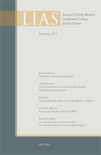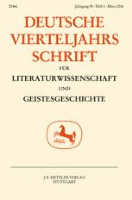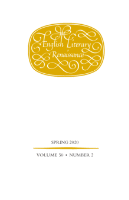
BIBLIOTHEQUE D HUMANISME ET RENAISSANCE
Scope & Guideline
Charting the Course of Cultural Evolution in Renaissance Studies.
Introduction
Aims and Scopes
- Humanism and Literature:
The journal focuses on the evolution of humanist thought and its impact on literature during the Renaissance, examining works from prominent figures like Montaigne and Rabelais. - Cultural and Social History:
It delves into the socio-political contexts of the Renaissance, exploring themes such as social ascension, witchcraft, and the dynamics of power within European societies. - Art and Aesthetics:
A significant area of interest includes the study of art, iconography, and aesthetics during the Renaissance, analyzing the works of artists like Raphael and Giorgione. - Religious and Theological Studies:
The journal addresses the intersection of religion and humanism, focusing on Protestant Reformation figures such as Calvin and their influence on society and culture. - Intellectual and Philosophical Developments:
The exploration of philosophical ideas and intellectual movements during the Renaissance is a key focus, including discussions on ethics, natural philosophy, and the humanities. - Textual Studies and Manuscript Culture:
The journal emphasizes the importance of manuscripts and textual transmission, studying how texts were produced, circulated, and interpreted throughout the Renaissance.
Trending and Emerging
- Interdisciplinary Approaches:
There is a growing trend towards interdisciplinary studies that combine literature, art, and social history, reflecting a broader understanding of the Renaissance as a complex and interconnected period. - Gender Studies and Feminist Perspectives:
An increasing number of articles explore gender dynamics and the roles of women during the Renaissance, indicating a shift towards inclusive narratives in historical scholarship. - Environmental and Ecological Perspectives:
Emerging themes include the exploration of environmental concerns and ecological perspectives within Renaissance texts, highlighting the relevance of these issues in contemporary scholarship. - Digital Humanities and Archival Research:
The rise of digital humanities is evident, with more studies focusing on the impact of digital tools in accessing and analyzing Renaissance texts and artifacts, showcasing the journal's adaptation to modern research methodologies.
Declining or Waning
- Early Modern Medicine:
Themes related to early modern medical practices and theories have become less frequent, possibly overshadowed by more prominent cultural and literary studies. - Classical Reception Studies:
The focus on the reception of classical texts and figures in Renaissance literature appears to be waning, with fewer papers dedicated to this intersection of classical and Renaissance studies. - Regional Studies of Lesser-Known Areas:
There has been a noticeable decrease in works focused on lesser-known regions of Renaissance Europe, suggesting a shift toward more prominent cultural centers like Italy and France.
Similar Journals

VIVARIUM-AN INTERNATIONAL JOURNAL FOR THE PHILOSOPHY AND INTELLECTUAL LIFE OF THE MIDDLE AGES AND RENAISSANCE
Bridging Eras: Unraveling the Philosophical Tapestry of HistoryVIVARIUM - AN INTERNATIONAL JOURNAL FOR THE PHILOSOPHY AND INTELLECTUAL LIFE OF THE MIDDLE AGES AND RENAISSANCE is a distinguished academic journal published by BRILL. Established in the Netherlands, this journal serves as a crucial platform for scholars and researchers interested in exploring the multifaceted intellectual currents that shaped the Middle Ages and Renaissance. With a commendable Q2 ranking in both History and Philosophy categories, VIVARIUM holds an esteemed place in the academic community, reflecting its significant contribution to these fields. The journal covers a broad temporal scope, accommodating research published from 1963 to the present, ensuring a rich archival resource for comparative and historical analysis. Despite being a non-open access periodical, its well-circulated articles are essential readings for students and professionals alike, aiming to deepen the understanding of philosophical thought and its implications across eras. As the study of these historic periods continues to resonate in contemporary discourse, VIVARIUM stands as a beacon for intellectual engagement and scholarly dialogue.

Ingenium-Revista Electronica de Pensamiento Moderno y Metodologia en Historia de la Ideas
Navigating the Complexities of Contemporary Philosophy.Ingenium - Revista Electronica de Pensamiento Moderno y Metodologia en Historia de la Ideas is a pivotal academic journal dedicated to the exploration and analysis of modern thought and methodological frameworks in the history of ideas. Published by the esteemed Universidad Complutense de Madrid, this journal serves as a vital platform for scholars interested in interdisciplinary studies that merge philosophy, history, and social sciences. With an ISSN of 1989-3663, Ingenium stands at the forefront of academic discourse, encouraging the dissemination of knowledge without barriers through its Open Access principles. By fostering a rigorous academic environment, Ingenium aims to enrich the scholarly community's understanding of the evolution of ideas and their impact on contemporary thought. As such, it is an essential resource for researchers, professionals, and students striving to navigate the complexities of modern intellectual landscapes.

Studia Aurea-Revista de Literatura Espanola y Teoria Literaria del Renacimiento y Siglo de Oro
Unlocking the Secrets of Spain's Literary HeritageStudia Aurea-Revista de Literatura Espanola y Teoria Literaria del Renacimiento y Siglo de Oro, published by the esteemed Universitat Autònoma de Barcelona, stands as a pivotal academic resource in the fields of Literature and History, specializing in Spanish literature from the Renaissance and the Golden Age. With its Open Access model established since 2007, this journal ensures that groundbreaking research is readily available to scholars and enthusiasts worldwide. Notably recognized for its quality, in 2023 it achieved Q1 rankings in both History and Literature and Literary Theory, reflecting its significant contribution to advancing knowledge in these domains. The journal's Scopus rankings further underscore its impact, placing it in the top 20% for literature and the top 37% for history. As it converges from 2018 to 2023, Studia Aurea continues to facilitate critical discussions, innovative research, and the exploration of literary theories, making it an essential platform for researchers, professionals, and students alike.

LIAS-Journal of Early Modern Intellectual Culture and its Sources
Advancing Scholarship in Early Modern Intellectual CultureLIAS - Journal of Early Modern Intellectual Culture and its Sources is a distinguished academic journal that delves into the rich tapestry of intellectual thought from the early modern period, exploring the interplay between culture, philosophy, and literature. Published by PEETERS in Belgium, this journal serves as a vital resource for scholars and students alike, offering a platform for rigorous research and innovative perspectives in the fields of History, Literature, and Philosophy. With an ISSN of 2033-4753 and an E-ISSN of 2033-5016, LIAS has earned notable rankings in the 2023 Scopus classifications, reflecting its commitment to scholarly excellence and its growing influence within these disciplines. Although it currently does not offer open access options, it is esteemed for publishing high-quality articles that illuminate the complexities of early modern intellectual culture and its enduring impact on contemporary thought. The journal's well-curated content holds significance for researchers keen on exploring interdisciplinary approaches and contributes meaningfully to ongoing educational discourse.

DEUTSCHE VIERTELJAHRSSCHRIFT FUR LITERATURWISSENSCHAFT UND GEISTESGESCHICHTE
Fostering Insights into the Dynamics of Thought and Culture.DEUTSCHE VIERTELJAHRSSCHRIFT FUR LITERATURWISSENSCHAFT UND GEISTESGESCHICHTE, published by J B METZLER, is a distinguished academic journal hailing from Germany that offers a profound exploration of literature, cultural studies, and philosophy. With its ISSN 0012-0936 and E-ISSN 2365-9521, this journal has been operational since its inception in 1973, continually contributing to the intellectual discourse surrounding literary and philosophical theories. The journal holds a recognized position within the academic landscape, achieving a Q3 ranking in Literature and Literary Theory and Q4 in both Cultural Studies and Philosophy as of 2023. Although it does not currently offer Open Access options, its impact in the field is underscored by its ranking in Scopus, where it is recognized amongst a competitive cohort of journals. Aimed at researchers, professionals, and students alike, the DEUTSCHE VIERTELJAHRSSCHRIFT serves as an invaluable resource for those investigating the intersections of literature and the broader cultural milieu, fostering an understanding of the dynamics that shape literary and philosophical thought.

ENGLISH LITERARY RENAISSANCE
Championing Innovative Approaches to Literary AnalysisENGLISH LITERARY RENAISSANCE, published by University of Chicago Press, stands as a pivotal academic journal in the realm of Literature and Literary Theory. With a historical pedigree dating back to 1971, this esteemed journal has made significant contributions to the study of English literature, exploring a wide array of themes, methodologies, and critical interpretations that underscore the richness of literary discourse. The journal is ranked in the Q2 category for literature and literary theory and is positioned in the 89th percentile in the Scopus rankings, affirming its impact within the field. Although it does not operate under an open access model, ENGLISH LITERARY RENAISSANCE continues to attract a vibrant community of scholars and educators eager to engage with its rigorous scholarship and innovative approaches. This journal not only serves as a platform for groundbreaking research but also fosters critical dialogue that shapes the future of literary studies.

Journal of Japanese Philosophy
Unveiling the Aesthetics and Ethics of JapanThe Journal of Japanese Philosophy, published by SUNY Press, serves as a pivotal platform for scholars and practitioners interested in the rich tapestry of Japanese philosophical thought. With its ISSN 2327-0195 and E-ISSN 2327-0209, this journal invites rigorous scrutiny and creative engagement with both traditional and contemporary philosophies emerging from Japan. While the journal does not currently offer Open Access options, it remains accessible through major academic libraries and databases. By fostering interdisciplinary dialogue, the Journal of Japanese Philosophy aims to illuminate various aspects such as aesthetics, ethics, politics, and environmental philosophy, contributing significantly to the broader field of philosophy. As a respected source of scholarship, it plays a critical role in shaping the understanding of Japanese philosophy within global contexts, making it an essential resource for researchers, professionals, and students alike.

RENAISSANCE QUARTERLY
Unveiling the Rich Tapestry of the RenaissanceRENAISSANCE QUARTERLY, published by Cambridge University Press, is a premier academic journal dedicated to the exploration and scholarship of Renaissance studies, encompassing history, literature, and the visual and performing arts. With an impressive impact factor reflecting its scholarly significance, it holds a distinguished position in the prestigious Q2 quartile across various categories, including History, Literature and Literary Theory, and Visual Arts and Performing Arts as of 2023. The journal caters to a broad audience of researchers, professionals, and students eager to engage deeply with Renaissance scholarship through a curated collection of articles, reviews, and critical essays. Although it does not provide open access options, RENAISSANCE QUARTERLY plays an essential role in advancing the academic discourse of the Renaissance period, fostering connections within the global scholarly community. Since its inception in 1971, it has continuously contributed valuable insights and perspectives on the multifaceted dimensions of Renaissance culture, making it a vital resource for anyone invested in this rich field of study.

RINASCIMENTO
Advancing Scholarly Discourse Since 1978RINASCIMENTO, an esteemed journal dedicated to the exploration of Cultural Studies, History, and Philosophy, is published by CASA EDITRICE LEO S OLSCHKI in Italy. Since its inception in 1978, this journal has made significant contributions to the scholarly discourse surrounding the rich tapestry of cultural and intellectual heritage. Although it currently holds a Q4 ranking in its respective categories according to the 2023 assessments, its commitment to high-quality research remains steadfast. The journal primarily serves as a platform for emerging ideas and critical analyses, providing scholars and students alike with access to unique perspectives. While it does not offer Open Access options, its relevance to the academic community is underscored by its ongoing dedication to nurturing a rigorous understanding of historical and philosophical contexts. With a focused audience that includes researchers, professionals, and students, RINASCIMENTO continues to be a vital resource for those looking to delve into the complexities of cultural history and philosophy.

Artibus et Historiae
Advancing Discourse in Arts and HumanitiesArtibus et Historiae is a distinguished academic journal published by IRSA PUBLISHING HOUSE, focusing on the fields of Visual Arts and Performing Arts within the broader scope of Arts and Humanities. With an ISSN of 0391-9064, this journal has become a crucial platform for the dissemination of scholarly research, critical discourse, and innovative ideas in art history and visual culture. Though its coverage in Scopus was discontinued in 2018, it maintained a respectable ranking of #279 out of 502 in its category, placing it in the 44th percentile. This positions Artibus et Historiae as a respected contributor to scholarly conversations in its field. Researchers, professionals, and students will find valuable insights and analyses that deepen their understanding of artistic practices and historical contexts. While not an open-access journal, it aims to bridge the gap between academia and broader audiences interested in the dynamic interplay of art and history.